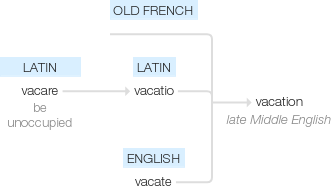Vacation
late Middle English: from Old French, or from Latin vacatio(n- ), from vacare ‘be unoccupied’ (see vacate).
wiktionary
From Middle English vacation, vacacion, vacacioun, from Anglo-Norman vacacioun, from Old French vacacion, vacation, from Latin vacātiō. Equivalent to vacate + -ion.
etymonline
vacation (n.)
late 14c., "freedom from obligations, leisure, release" (from some activity or occupation), from Old French vacacion "vacancy, vacant position" (14c.) and directly from Latin vacationem (nominative vacatio) "leisure, freedom, exemption, a being free from duty, immunity earned by service," noun of state from past-participle stem of vacare "be empty, free, or at leisure," from PIE *wak-, extended form of root *eue- "to leave, abandon, give out."
Meanings "state of being unoccupied," "process of vacating" in English are early 15c. Meaning "formal suspension of activity, time in which there is an intermission of usual employment" (in reference to schools, courts, etc.) is recorded from mid-15c. As the U.S. equivalent of what in Britain is called a holiday, it is attested from 1878.
vacation (v.)
1866, from vacation (n.). Related: Vacationed; vacationing.
